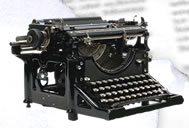War correspondents see and hear about many courageous acts that serve as a testimony to the level of personal commitment held high by many (but not all) of the American soldiers, sailors, airmen and Marines who served in the Second World War, and when I read the opening paragraphs about this hero, I knew it was going to be unique:
"His name is Staff Sergeant Henry E. Erwin of Bessemer, Alabama. He was the radio operator on a B-29, and what he did, we think, was the bravest thing we ever heard of."
This 1945 article by George Creel reported on the brave and selfless acts of Robert D. Maxwell (1920 - 2019):
"COURAGE, like everything else, has its kinds of degrees. No one would detract a hair's weight from the bravery of the firing line, but in battle there is the heartening touch of a comrade's shoulder, the excitement of the charge, and the 50-50 chance of coming out alive. All these aids are lacking in those epic instances where men make death a deliberate choice...one example that stands out for sheer drama and sustained fortitude is that of Technician Fifth Grade Robert D. Maxwell, who covered a German hand grenade with his body, smothering the explosion that would have killed every member of his group."
Maxwell survived his wounds; seven months later he was awarded the Medal of Honor for his courage. He currently reside in Oregon.
Carlton Rouh was awarded the M.o.H. for performing numerous acts of courage on the South Pacific island of Peleliu during the September of 1944; in this article he speaks bluntly about the nature of heroes and the discomfort they experience when being praised in a nation that was so deeply in need for such men.
Click here to read about another W.W. II Medal of Honor recipient.
This is a humorous World War II story about the heroics of Captain Charles W. Davis (1917 – 1991), former resident of Guadalcanal, and his experiences with the U.S. Army Command and General Staff School at Fort Leavenworth, Kansas.
We're sure that Pvt. Lloyd McCarter of Takoma, Washington would have undoubtedly preferred to have been anywhere else but the island of Corregidor during the February of 1945, but there were no other legal options open to him at the time. This proved to be bad luck for some thirty Japanese soldiers who happened to have been in that same zip code.
Audie Murphy (1925 – 1971) was one of the most decorated American combat soldiers of the Second World War. This article appeared on the newsstands just in time to promote
To Hell and Back
, the Universal Studio movie based on Murphy's 1949 wartime memoir of the same name. Some men fit quite comfortably into the public life of a celebrated hero, Audie Murphy was not one of them.
John "Killer" Kane (1907 – 1996) proved his mettle numerous times throughout the Second World War, but it was on August 1, 1943 - above the blackened skies of
the Ploesti oil refineries in Romania, that the brass caps of the U.S. Ninth Air Force sat up and truly took notice of his polished skills as a pilot of a B-24 bomber. He was awarded the Congressional Medal of Honor for the admirable mixture of confidence and ability that showed so clearly that day.
In the attached article, the pilot recalled the moment when he was made aware that the number four engine had been hit
"and we increased power on the other three. As soon as we left the target we dropped down to tree-top level. We were right in the middle of the group and I could see other ships passing us as we lost speed. Then the Junker 88s and the ME 105s came to work on us. It was a sight I can never forget, seeing B-24s falling like flies on the right and left of us. But we were getting our share of fighters, too. It was a rough show."
High praise is heaped on Colonel Kane for all of nine pages - celebrating his enormous personality as much as his sang-froid in battle.
Click here to read further about the Ninth Air Force raid on Ploesti.
Lloyd Cortez Hawks (1911 - 1953) was a U.S. Army private and a recipient of the United States military's highest decoration for valor — the Congressional Medal of Honor. Hawks performed his celebrated acts of derring-do while serving as a medic attached to the 30th Infantry Regiment, 3rd Division outside of Carano, Italy.
Lt. Alexander Nininger, Jr. (1918 - 1942) was posthumously awarded the first Medal of Honor of the Second World War, but regardless of that fact he got the brush-off in this column which was primarily written in order to inform the public of a new CBS radio program. The radio show was titled CMH and was intended to tell the individual stories of each and every MoH recipient of W.W. II.
"For risking his life twice to save his platoon when they were pinned down by Jap fire during the Battle of Finegayan on Guam, Pfc. Frank Peter Witek, USMCR, has been posthumously awarded the Congressional medal of Honor.
